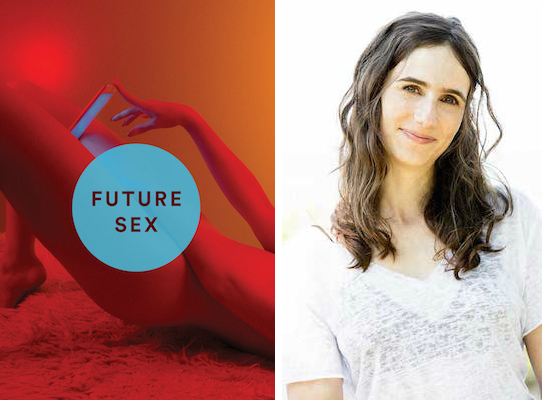By Stef Hayes
What would Didion do? Emily Witt wonders in her 2015 essay “Are You ‘Internet Sexual?’” while deciding whether or not to broadcast herself to a sea of strangers on the sex cam site Chaturbate. Witt wants to understand what it is to be a woman online, but she’s hesitant, afraid her mostly middle-aged male editors might not take her seriously when they find out — and anyway, she’s dating someone. “Joan Didion would never have sex cammed,” Witt concludes, “she went to San Francisco in 1968 and didn’t even do acid.”
This essay appears as a chapter in Witt’s first book, Future Sex, released on October 11th from Farrar, Straus and Giroux. The nod to Didion has been scrubbed from the essay, but references to the literary icon pepper the book. Witt compares the techy, quasi-utopian San Francisco of today with the gritty, hippie Haight-Ashbury of Slouching Towards Bethlehem. At one point, a man Witt sleeps with tells her he’s been reading Didion’s “On Self-Respect.” Witt laughs; “it was her worst essay.”
Didion is a fitting spirit guide for Witt, whose quest in Future Sex is, in many ways, a literary one: she’s searching for a narrative alternative to monogamy, and the right language to describe the sexual experiences of women in their twenties and thirties.
But Witt is more daring than Didion. In each of the book’s chapters, she delves into — and frequently participates in — a different sex-keen community or relationship model. She visits an orgy dome at Burning Man. She lurks on a sex-cam site where a woman holds court over a “forest of men in desk chairs” by delivering existential monologues. She watches as a Bambi-eyed blonde is stripped, gagged, and dominated at a live shoot for the pornography site Kink.com. She lies in a “nest” of cushions while a relative stranger poetically describes her vulva, as part of the pseudo-yogic practice of orgasmic meditation.
The book has its less wild — though no less significant — moments. There’s a diatribe about the unsophisticated, limiting birth control options currently available to women, and a chronicling of the string of dull dates Witt meets online. Throughout, Witt is observant and open-minded, but not without healthy doses of skepticism and humor.
The day before her book hit stores, I spoke with Witt about Future Sex, Tinder, and what happens when your work and romantic life merge.

STEF HAYES: I had read a few of your essays in various publications online over the years, so I was excited to see you’d written a book on these topics. I’m curious: what prompted you to start writing essays on sex and sexuality and relationships, in the first place?
EMILY WITT: Part of the reason I wanted to write this book was that the things I was reading about contemporary sexuality made me feel trapped. They made me feel like the only respectful, stable, comfortable way a woman can exist in the world is to have this, like, magical partner who’s a feminist, and they raise their kids in equality and remain married and monogamous. It’s this anachronistic idea…well, no! It never existed. It’s a mythology. Then, what I was reading in contrast to that was this apocalyptic nihilism about “hookup culture.” Sex without intimacy and all this stuff. I wanted to find a middle path that acknowledged the possibilities of the present in an optimistic way.
The first essay appeared in the London Review of Books in 2011, right? How did this project grow into a book?
It’s funny, I actually got the book deal first, before I’d written any of the essays. I’d proposed this third person cultural history of recent, post-internet sexuality. I’d intended to model the book on Thy Neighbor’s Wife by Gay Talese, which is a cultural history of the sexual revolution. It wasn’t really until I started looking into stuff and visiting places and talking to people that I realized I was using the book as sort of a facade, an alibi, by which I could explore these communities for my own gain. Then the book became more personal.
How’d you make that jump — from a third-person cultural history to a book that straddles the bounds between reportage and memoir?
The piece about Kink [a pornography company that produces a BDSM series called Public Disgrace whose live shoot Witt attended] first appeared in n+1 in 2013. It was originally for another magazine and it got killed. My editor at n+1, Keith Gessen — he’s an amazing editor — helped me frame it in the first person. But when I went to put it in the book, the thing my book editor kept noticing was that I didn’t talk about my own experiences. I just couldn’t do that — it took me a couple drafts. Every time I started adding personal details in I thought about someone making fun of me. I’m just not a performative person and I guess I didn’t want the book to be self-absorbed. Eventually my editor was like: “Yeah, they’re going to make fun of you, you just have to do it.”
A number of the book’s chapters are set in San Francisco or revolve around the culture it has created or proudly houses. What drew you to San Francisco as a representation of current or future ideas of sexuality and relationships? Why not just write about New York?
Any of those communities I describe are here in New York, too. But if I was in New York, I would never have lost that self-consciousness; it was much easier for me to go some place different and get outside of my comfort zone. And of course, San Francisco, because of its whole gay rights movement and free love history, has a culture of openness to self-inquiry that on the East Coast is not as pronounced. I felt like I was meeting somebody on every street corner who was telling me about their lifestyle experiments, whereas in New York people were kind of resting in their cynicism. I guess I got there in this very particular time; it coincided with a kind of national consciousness that the new corporate culture was going to be defined by companies based in San Francisco, that the new culture of wealth in America was going to be defined there. It was an interesting coincidence.
How do you balance being a reporter and a participant in these kinds of settings? How can you be in the moment — on sex cam sites or in orgasmic meditation seminars or swinger parties — while also taking mental notes?
You can’t let go — I was in this kind of nether-region of needing the journalism to get there in the first place and using the journalism to hide. With the orgasmic meditation, people saw it as a cult, and still kind of do, so I was always really upfront that I was a journalist. It was affecting me personally, though. But because I was viewing myself as a journalist it was only later — once I was back in the comfort of my own life and my own space — that I realized how much I was thinking about stuff. Whereas when I was in the environment I was really standoffish.
And how did it affect you personally?
I felt some of the things that [the orgasmic meditation group] described about experiencing sexual desire with an anxiety, or refusing to feel and describe things that were happening, or responses that my body was having. I think that was really true for me. And it wasn’t because I’d grown up in some sort of repressive environment; I just had this idea of my sexuality as something that could be used to punish me or something, if I expressed it too openly.
You seemed skeptical of OneTaste [the orgasmic meditation group] and online dating, and interested in Burning Man and the kind of female agency you saw on Chaturbate, but not really satisfied by any one community or approach. What are you hoping readers will feel or take away from this?
Even though some of these communities aren’t for me, I realized that I was grateful they exist. It made me feel happier and less trapped to know that if my life didn’t work out according to a certain model, there were other ways of being. Maybe at a different time in my life…who knows? It was no longer this thing where if I didn’t get married by 40 I was going to be confined to some celibate, lonely existence. I realized there was no reason to see life in those terms. That’s what I hope people will feel coming away from the book; there’s a lot of sexual possibility out there, and if your life doesn’t conform to certain ideas, it’s worth undergoing an exploration of other ways of being.
Has writing this book and thinking about these topics for five years changed your approach to relationships?
Definitely. I would never go into a relationship now without a discussion of how we’re going to define commitment, instead of commitment being something that the culture defines for us.
And are you finished exploring this topic? What’s next?
I’m writing an article right now about virtual reality porn. And I’m interested in alternative family models, so if I decide to have a kid, that’s something I would want to look into. But I’m ready to move on to something different — I don’t want this to be my life’s project. It was a huge relief to finish the book and know that I no longer had to think about my sexual decisions in that way…When you’re writing something, it’s on your mind all the time and there was a way in which I could neither be here nor there. Every decision seems a little more fraught. I’m interested in another group of subcultures right now…I’m interested in drugs.


